D
Dave Coster
Guest
ESTATE LAKES
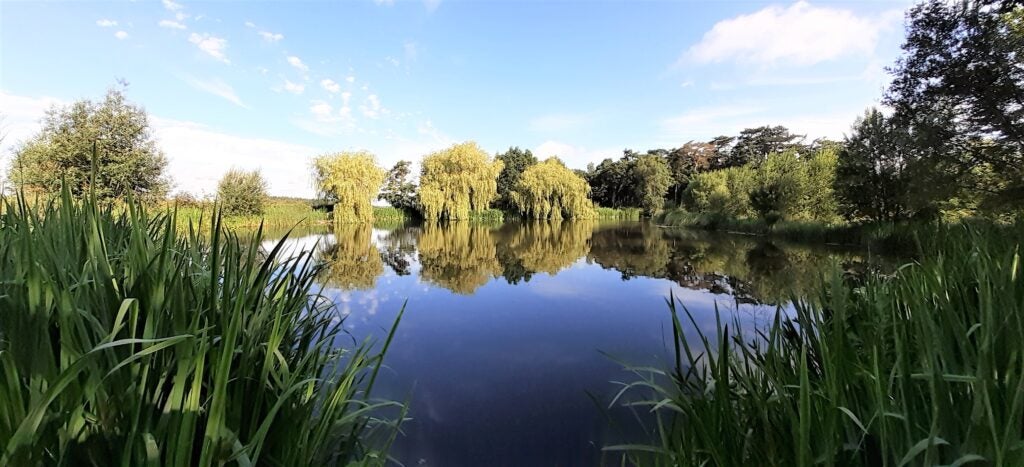
Mention tench, and I suspect most anglers associate this species with late spring or early summer, watching the early morning mist lifting off a lily-fringed estate lake. That is certainly one of my cherished memories, after getting the chance many years ago to fish with Peter Drennan on his private Oxford water. Back then it was a case of watching the tip of one of his famous crystal wagglers being surrounded by patches of bubbles, the odd tremble showing up, as something deep down brushed against the line. The float would dither, but frustratingly not always go under, while the dawn feeders were fizzing all over the place. When the float did disappear, it would often be without warning. One second it was there, the next it was gone. You had to be alert and ultra-fast with your strike to connect. My closest venue to an estate lake these days is a mature brick pit, brimming with tench, but without the associated big house.
UNUSUAL TACTICS
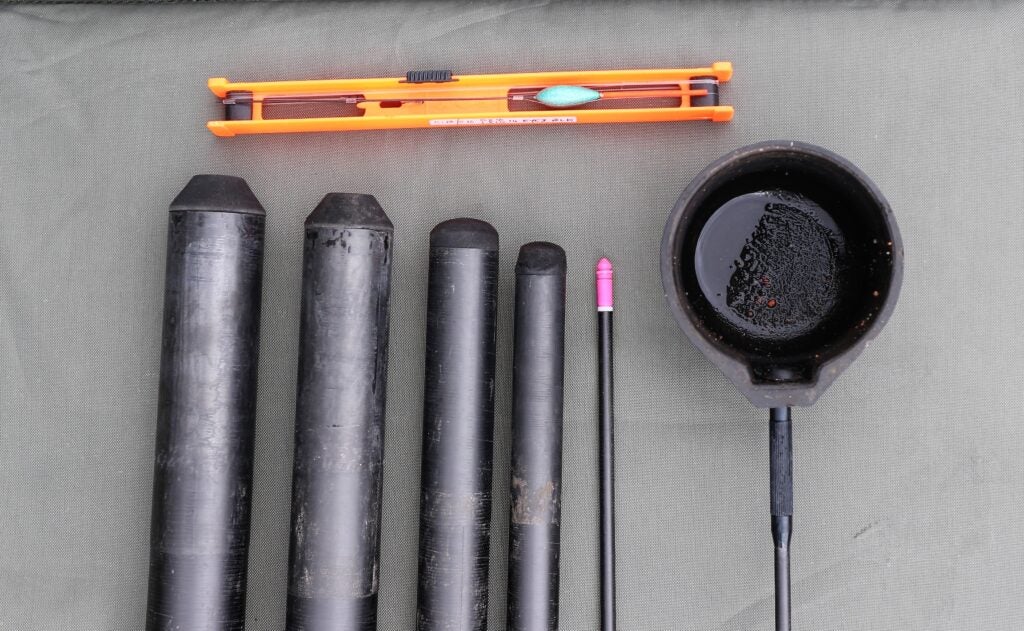
Another venue where I first honed my tench fishing skills was the Met Police pits at West Drayton. I was introduced to these by London copper Don Manly, who sadly passed away recently. Don used to be a frequent customer when I had a tackle shop in North London, and was always enthusiastic about one particular water, fringed by the River Colne and the Slough Arm. It was a magical place, quite deep in places, which led to an unusual tactic. On one ridiculously early morning session, Don told me to fish a waggler set shallow in the deeps and spray casters around it every chuck. This resulted in lots of missed bites, which were like lightning, and I thought caused by small fish, until I suddenly connected with one. My float rod arched round and I was attached to a big wild demon of a tench. It was the beginning of some unbelievable fishing. I have an equally offbeat tactic for this species these days, using a strong margin pole with carp-style rigs.
MAGIC CUPS
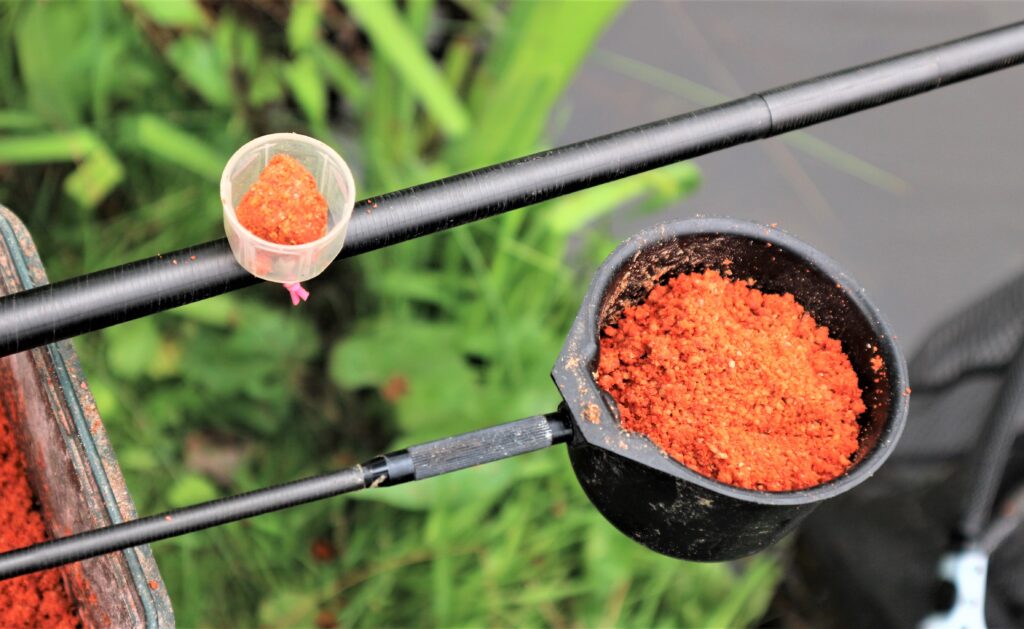
Weed is a major problem on my new version of an estate lake, and a margin pole turned out to be a good way to get through it. These things are built to handle hefty carp on commercial fisheries, where the inhabitants have grown big, but most importantly, allow inch-perfect feeding and presentation. Another problem a short pole helped to sort out was dumping bigger hook baits through the hoards of rudd, which can be like a firewall when you are trying to get to the tench underneath. My method was simple: not to feed anything likely to send the rudd into a feeding frenzy. Maybe sneak some pellets in, but mainly to concentrate on introducing lumpy groundbait in loose form, something that’s great at fooling the craftiest of tench. Best recipes have proved to be red krill or green fishmeal, deliberately mixed up rough and ready, using a dollop of paste or a large pellet over the top. Everything is cupped in very precisely.
SIMPLE RIG
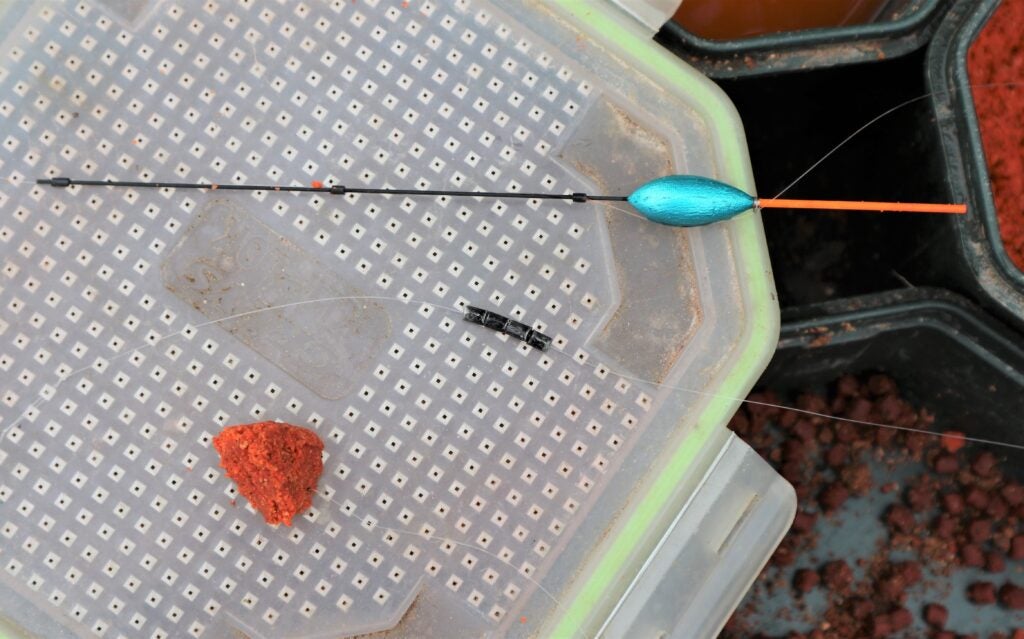
I first began fishing with groundbait paste for carp, but quickly discovered species like bream and tench are also mugs for this bait. I suspect it’s due to them learning how to mop up groundbait as a free meal, while ignoring anything with life in it like maggots or worms, along with baits that stand out like casters, sweetcorn and hard pellets. But drop a ball of paste, or a soft similar-flavoured pellet over a bed of groundbait, and crafty feeders are often fooled into sucking it in. I use a pole float with a long bristle, a simple bulk, no dropper shot, and a big wide gape hook. Line needs to be strong, combined with powerful pole elastic. The trick is, when plumbing up, to set the float at full depth so its tip is well dotted down. A big dollop of paste cocks everything the same way, so the rig is nicely balanced. A bite will usually pull the float under, but if the soft bait comes off, the float tip slowly rises, which prevents you wasting time with a bare hook.
CATCHING MORE
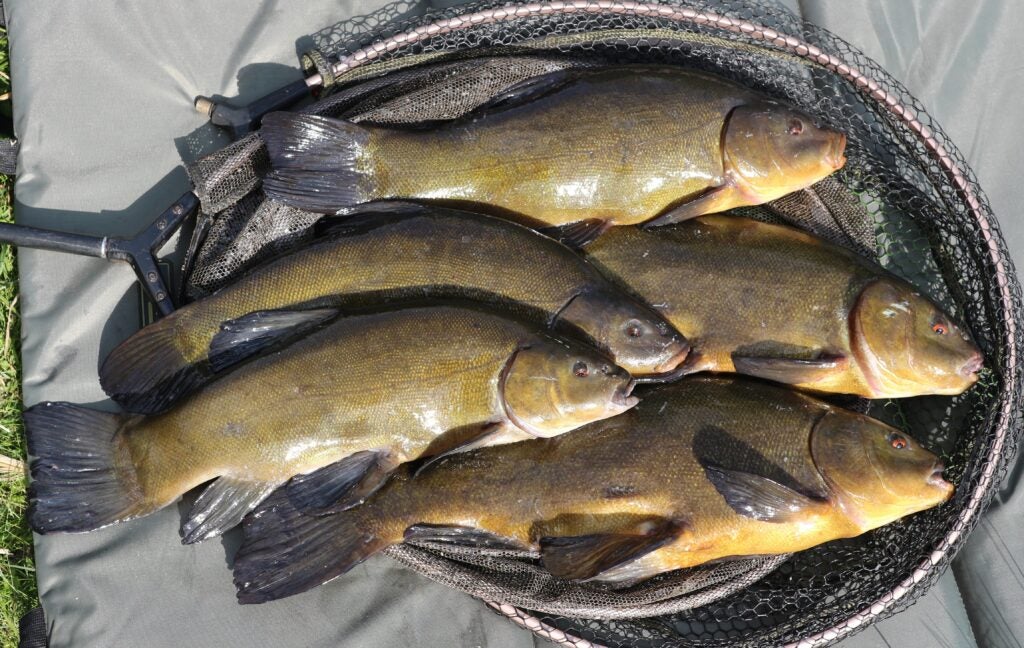
Tench are often thought of as best to target in spring and early summer, which is probably due to the monster, spawn-bound specimens that are caught at that time of the year. However, I enjoy targeting this species right through to late autumn, not being into chasing any records. A 4lb tench is a brilliant fish to me, while anything bigger is a great bonus. But once June has been and gone, tench do become a lot trickier to catch. As previously mentioned, even sizeable fish have a habit of producing lightning-fast bites on float gear. They can drive you mad on small baits like maggots and casters, as can other species that often muscle in on proceedings. Casters are a particularly good tench attractor, but you often have to wade through hordes of roach, rudd, skimmers and perch to get through to them. I find paste does away with all that, providing a short cut. Odd small fish do suck it in, but generally it gets through and finds the target.
CHASING SHADOWS
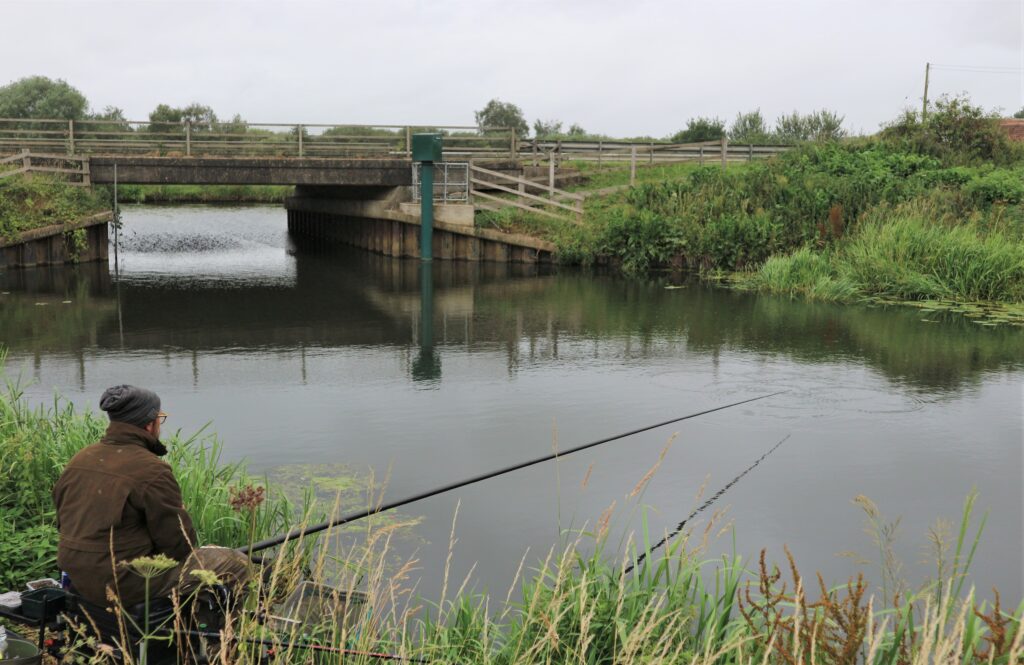
Drain and canal tench fascinate me too, because these fish can be even more elusive than their lake cousins. One of the biggest problems is locating them. On my local Fossdyke Canal in Lincolnshire, tench can travel huge distances. Apart from 11 miles of lock-free towpath, several rivers link up, so they could almost end up in in a different county! Mainly I catch tench by accident on canals and drains when targeting other species, but when I fish areas where I suspect the odd one might be on the cards, I do have a useful tip. In these situations I use hybrid elastic in my pole’s top kits. It’s amazing how many big bonus fish I’ve landed on light tackle with this, using thin diameter lines tied to small fine wire hooks. The new breed of solid hybrid shock absorbers stretch so much further than standard or hollow elastics, without ever seeming to bottom-out. But you do need a puller bung set up to get back some control when big fish steam off.
BOLT HOLE
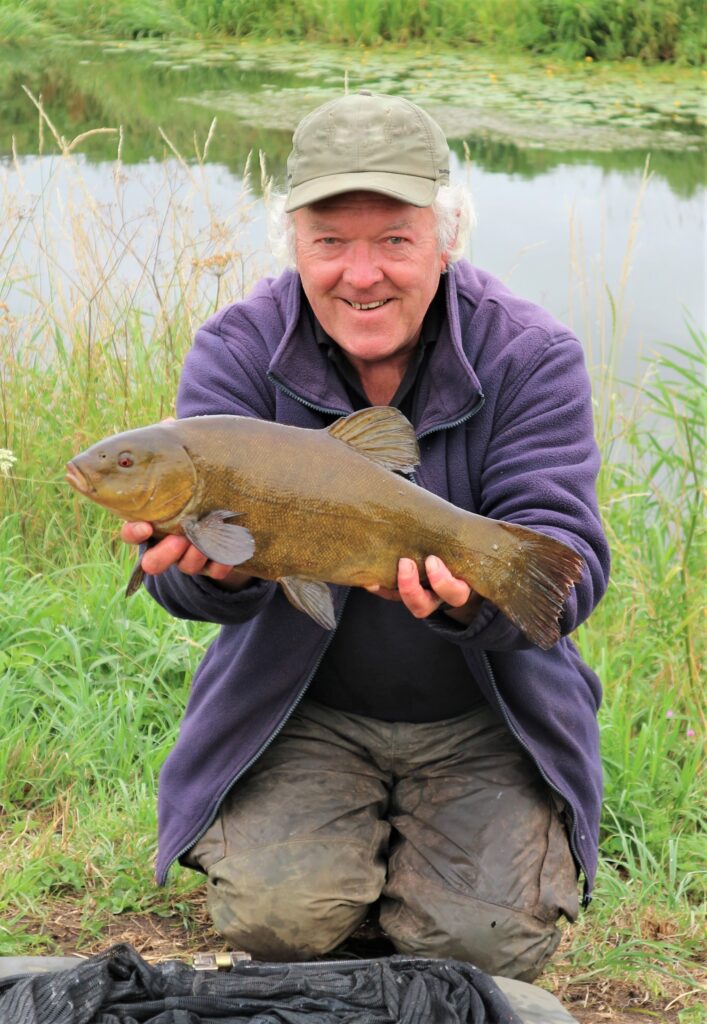
The basin where the River Till runs into the Fossdyke, seen in the previous photograph, is where I caught this cracking tench. It had probably holed up in this area to get away from the busy boat traffic on the main canal, situated on the other side of the road bridge. With a lily-fringed far bank, I had a feeling something big could be lurking in the swim I had chosen. But the water was gin-clear and I had to scale down to a 0.10mm rig to get bites. It was small skimmers, rudd and roach to begin with, after which introducing some chopped worm brought perch into the picture. I had just been bitten off by a pike when I spotted a small cluster of bubbles over my feed line. I quickly shipped out double casters over this and it wasn’t long before I was attached to a heavy, powerful weight. My hybrid elastic shot out a long way up the small, slow-moving river. But once I got hold of the puller bead, it was surprising how quickly I tamed this beauty.
MATCHING BAITS
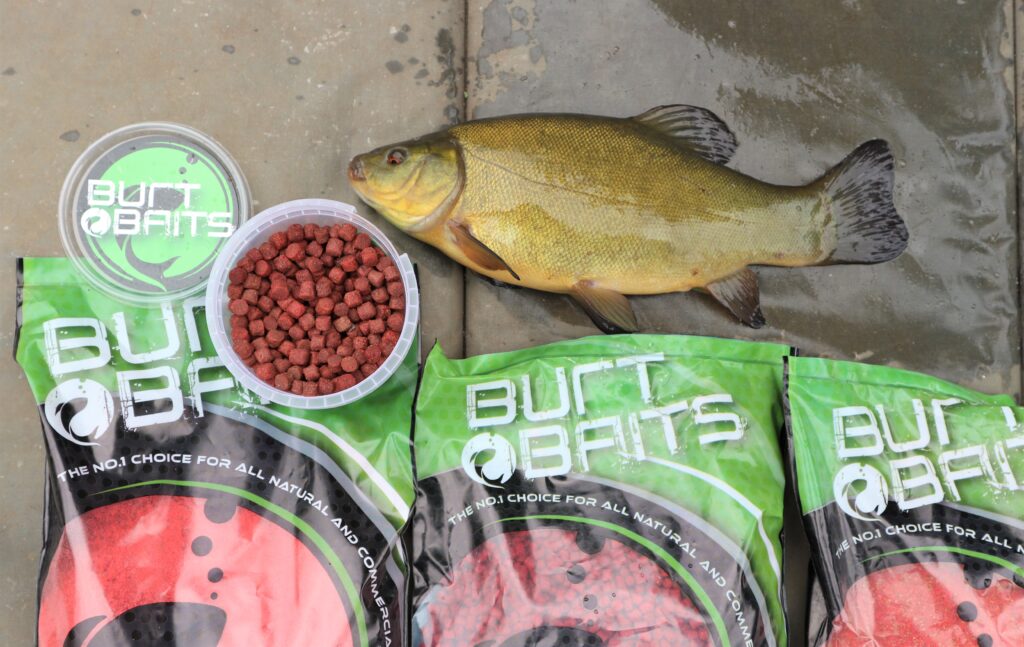
Something that used to annoy me a lot when using pellet-based baits for tench was not many companies had closely related products. By that I mean it was hard to find groundbaits, pastes and various sized pellets the same colour and made from the same ingredients. Dynamite started doing this, and then I discovered Burt Baits have proper ranges too. I particularly like their set of krill offerings, giving me matching feed pellets, hooker pellets, groundbait, slop mix and paste. With that lot I can experiment, to find exactly what the fish want. Feeding micro pellets in groundbait can be effective to hold fish longer, using 6mm hookers or paste over the top. I can also try a banded hard feed pellet, wafters, or pop-ups – all useful if small fish are troublesome. Using this approach with my margin pole makes for a cheap day’s sport. I often sack up with half a bag of groundbait and the same amount of pellets, plus a smattering of hook baits.
FINDING THEM
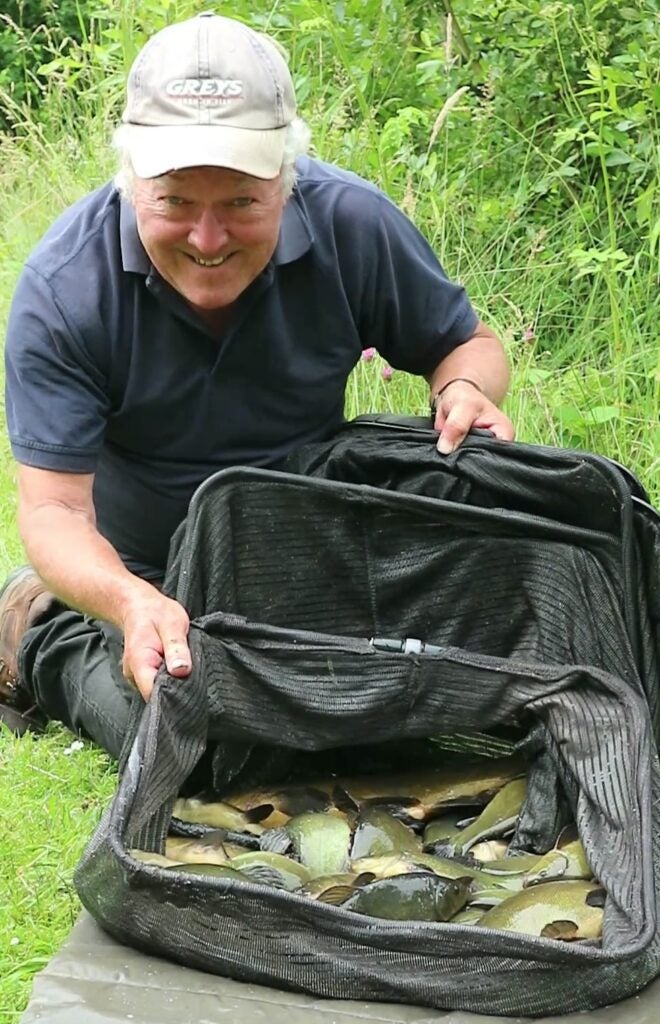
It fascinates me how on some venues you hardly ever see a small tench, unless maybe when dragging weed out of a swim, where sometimes a few fingerlings need to be returned. Yet on other waters, like my mock estate lake, it’s currently heaving with them. Instead of having to wade through piles of rudd to get at the bigger ones, I often have to amass several dozen tench up to the pound mark, before finding the proper lumps. The latter are normally located feeding with caution around the edges of where I am fishing. As you can see here, smaller tench can be a mixture of green and olive colours, while larger ones sometimes turn almost black from where they have been living in dark bottom silt. I’ve also caught golden tench, notably from the lake shaped like this species at Angler’s Paradise. My best match haul of tench was over 70lb and that came from Derek Rowley’s Lakeland Fishery, an unusual snake-like venue over in Ireland.
GREAT SURVIVORS
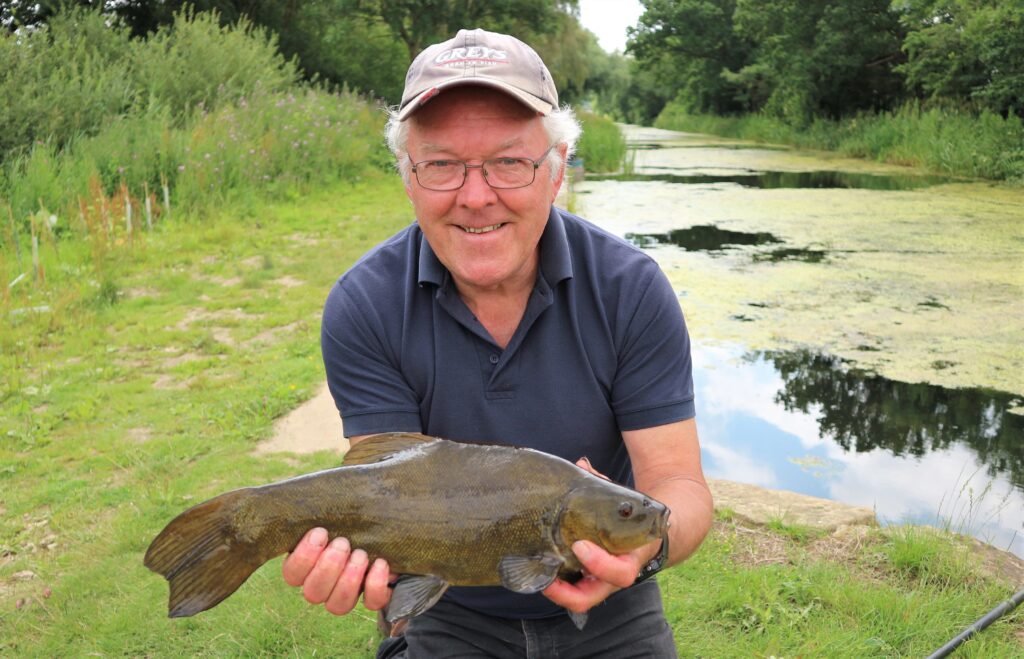
As I highlighted in one of my recent Fishing Magic features, tench can survive extremely dire conditions. Weed has been a constant problem on my local Grantham Canal since I have lived in the area for the past five years. This summer it has been worse than ever, forcing me to seek out the few remaining places where the waterway is clear. It has been so bad I had to resort to fishing inside a lock to catch this prehistoric-looking fish. Most pounds are covered with a thick carpet of duckweed, looking and smelling like dirty dishwater if you poke a hole in it. Yet miraculously come every spring, after each winter has killed off or washed away the weed menace, somehow these old warriors manage to turn up again. It’s much the same on the fenland drains, where each year it’s a battle to keep the weed at bay. Booms and special weed clearing boats help a bit, and there are some surprisingly big tench, but you need to work hard to find them.
RESERVOIR DOGS
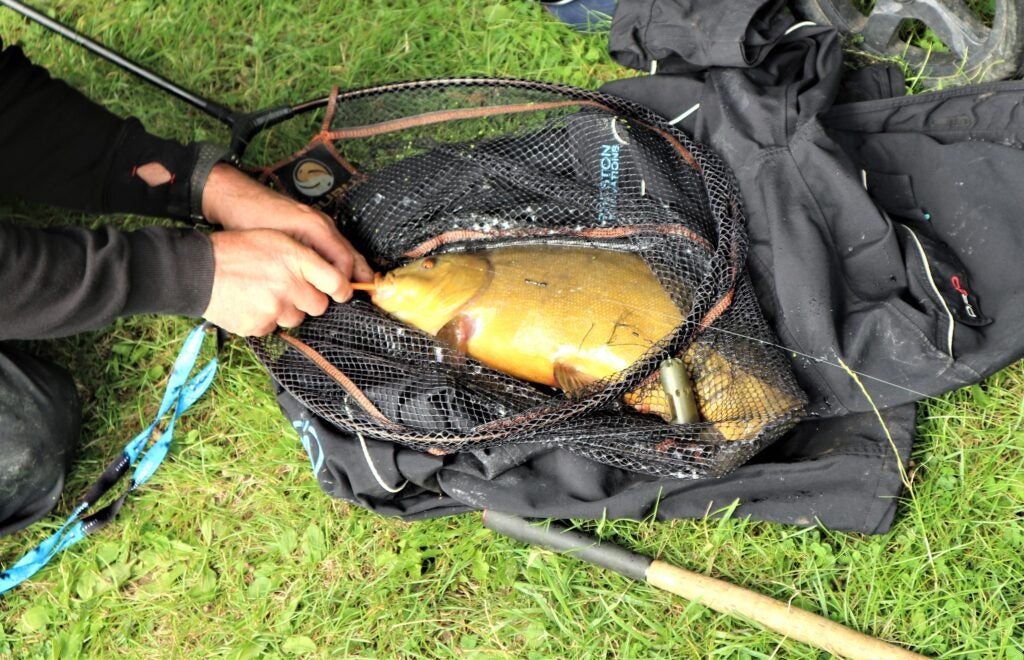
My biggest tench over recent years have come from Denton Reservoir, which feeds water into the Grantham Canal. Although a key is needed to get your car into this venue, there are plenty of public access points and walkways around the place. Unfortunately, this has led to major problems during the various lockdowns, making such an out-of-the-way spot popular with partying youngsters. Piles of litter, swimmers, loud music, and goodness knows what else, have virtually made the venue a no-go area. A great shame because a couple of years ago my mates and I were catching some huge tench. The fishing was never easy, but the rewards were big. My pal Chris caught this corker fishing at extreme range with a window feeder and hair-rigged sweetcorn, a tactic that also brought him a double figure bream. I even managed to make my margin pole work its magic, along with medium to long range groundbait feeders and different waggler set-ups.
NOT EASY
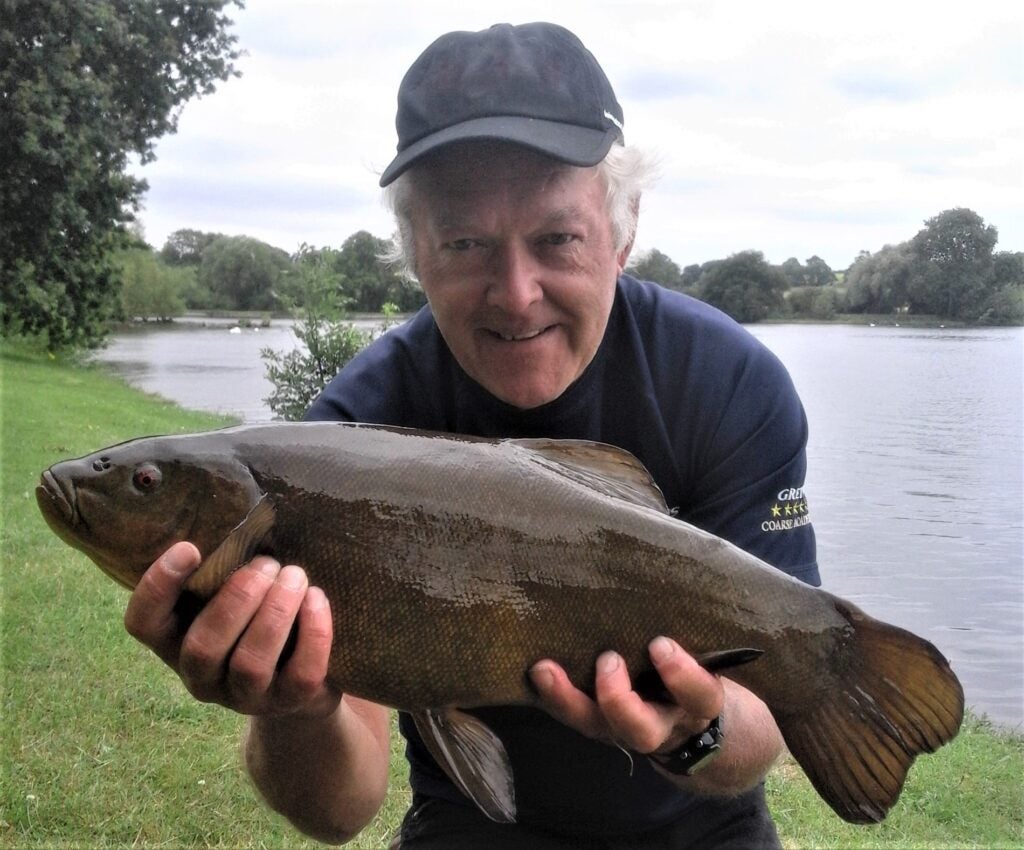
Tench fishing is never straightforward. I’ve always had to work hard at catching this species, which can be extremely cunning when it comes to bigger and wiser fish. I’ve experienced sessions where bubbles have been fizzing around my float all day long, and yet it just wouldn’t go under. I’ve had to learn to coax bites by occasionally twitching the hook bait, or lifting and letting it drop down again. It’s never easy with feeder tackle either. You can cast out and wait for a bite all day, but working harder with more regular loadings of groundbait, pellets, or whatever else you are putting in, often makes something happen. Rotating hook offerings helps too, along with experimenting with depth settings on float tackle and trace lengths on feeder rigs. All are crucial, but sometimes whatever you do, it doesn’t make a difference. It can be down to weather, time of day, or light conditions. Tench can delight you, but also have the ability to shut you out!
The post Tackling Tench first appeared on FishingMagic Magazine.
Continue reading...

Mention tench, and I suspect most anglers associate this species with late spring or early summer, watching the early morning mist lifting off a lily-fringed estate lake. That is certainly one of my cherished memories, after getting the chance many years ago to fish with Peter Drennan on his private Oxford water. Back then it was a case of watching the tip of one of his famous crystal wagglers being surrounded by patches of bubbles, the odd tremble showing up, as something deep down brushed against the line. The float would dither, but frustratingly not always go under, while the dawn feeders were fizzing all over the place. When the float did disappear, it would often be without warning. One second it was there, the next it was gone. You had to be alert and ultra-fast with your strike to connect. My closest venue to an estate lake these days is a mature brick pit, brimming with tench, but without the associated big house.
UNUSUAL TACTICS

Another venue where I first honed my tench fishing skills was the Met Police pits at West Drayton. I was introduced to these by London copper Don Manly, who sadly passed away recently. Don used to be a frequent customer when I had a tackle shop in North London, and was always enthusiastic about one particular water, fringed by the River Colne and the Slough Arm. It was a magical place, quite deep in places, which led to an unusual tactic. On one ridiculously early morning session, Don told me to fish a waggler set shallow in the deeps and spray casters around it every chuck. This resulted in lots of missed bites, which were like lightning, and I thought caused by small fish, until I suddenly connected with one. My float rod arched round and I was attached to a big wild demon of a tench. It was the beginning of some unbelievable fishing. I have an equally offbeat tactic for this species these days, using a strong margin pole with carp-style rigs.
MAGIC CUPS

Weed is a major problem on my new version of an estate lake, and a margin pole turned out to be a good way to get through it. These things are built to handle hefty carp on commercial fisheries, where the inhabitants have grown big, but most importantly, allow inch-perfect feeding and presentation. Another problem a short pole helped to sort out was dumping bigger hook baits through the hoards of rudd, which can be like a firewall when you are trying to get to the tench underneath. My method was simple: not to feed anything likely to send the rudd into a feeding frenzy. Maybe sneak some pellets in, but mainly to concentrate on introducing lumpy groundbait in loose form, something that’s great at fooling the craftiest of tench. Best recipes have proved to be red krill or green fishmeal, deliberately mixed up rough and ready, using a dollop of paste or a large pellet over the top. Everything is cupped in very precisely.
SIMPLE RIG

I first began fishing with groundbait paste for carp, but quickly discovered species like bream and tench are also mugs for this bait. I suspect it’s due to them learning how to mop up groundbait as a free meal, while ignoring anything with life in it like maggots or worms, along with baits that stand out like casters, sweetcorn and hard pellets. But drop a ball of paste, or a soft similar-flavoured pellet over a bed of groundbait, and crafty feeders are often fooled into sucking it in. I use a pole float with a long bristle, a simple bulk, no dropper shot, and a big wide gape hook. Line needs to be strong, combined with powerful pole elastic. The trick is, when plumbing up, to set the float at full depth so its tip is well dotted down. A big dollop of paste cocks everything the same way, so the rig is nicely balanced. A bite will usually pull the float under, but if the soft bait comes off, the float tip slowly rises, which prevents you wasting time with a bare hook.
CATCHING MORE

Tench are often thought of as best to target in spring and early summer, which is probably due to the monster, spawn-bound specimens that are caught at that time of the year. However, I enjoy targeting this species right through to late autumn, not being into chasing any records. A 4lb tench is a brilliant fish to me, while anything bigger is a great bonus. But once June has been and gone, tench do become a lot trickier to catch. As previously mentioned, even sizeable fish have a habit of producing lightning-fast bites on float gear. They can drive you mad on small baits like maggots and casters, as can other species that often muscle in on proceedings. Casters are a particularly good tench attractor, but you often have to wade through hordes of roach, rudd, skimmers and perch to get through to them. I find paste does away with all that, providing a short cut. Odd small fish do suck it in, but generally it gets through and finds the target.
CHASING SHADOWS

Drain and canal tench fascinate me too, because these fish can be even more elusive than their lake cousins. One of the biggest problems is locating them. On my local Fossdyke Canal in Lincolnshire, tench can travel huge distances. Apart from 11 miles of lock-free towpath, several rivers link up, so they could almost end up in in a different county! Mainly I catch tench by accident on canals and drains when targeting other species, but when I fish areas where I suspect the odd one might be on the cards, I do have a useful tip. In these situations I use hybrid elastic in my pole’s top kits. It’s amazing how many big bonus fish I’ve landed on light tackle with this, using thin diameter lines tied to small fine wire hooks. The new breed of solid hybrid shock absorbers stretch so much further than standard or hollow elastics, without ever seeming to bottom-out. But you do need a puller bung set up to get back some control when big fish steam off.
BOLT HOLE

The basin where the River Till runs into the Fossdyke, seen in the previous photograph, is where I caught this cracking tench. It had probably holed up in this area to get away from the busy boat traffic on the main canal, situated on the other side of the road bridge. With a lily-fringed far bank, I had a feeling something big could be lurking in the swim I had chosen. But the water was gin-clear and I had to scale down to a 0.10mm rig to get bites. It was small skimmers, rudd and roach to begin with, after which introducing some chopped worm brought perch into the picture. I had just been bitten off by a pike when I spotted a small cluster of bubbles over my feed line. I quickly shipped out double casters over this and it wasn’t long before I was attached to a heavy, powerful weight. My hybrid elastic shot out a long way up the small, slow-moving river. But once I got hold of the puller bead, it was surprising how quickly I tamed this beauty.
MATCHING BAITS

Something that used to annoy me a lot when using pellet-based baits for tench was not many companies had closely related products. By that I mean it was hard to find groundbaits, pastes and various sized pellets the same colour and made from the same ingredients. Dynamite started doing this, and then I discovered Burt Baits have proper ranges too. I particularly like their set of krill offerings, giving me matching feed pellets, hooker pellets, groundbait, slop mix and paste. With that lot I can experiment, to find exactly what the fish want. Feeding micro pellets in groundbait can be effective to hold fish longer, using 6mm hookers or paste over the top. I can also try a banded hard feed pellet, wafters, or pop-ups – all useful if small fish are troublesome. Using this approach with my margin pole makes for a cheap day’s sport. I often sack up with half a bag of groundbait and the same amount of pellets, plus a smattering of hook baits.
FINDING THEM

It fascinates me how on some venues you hardly ever see a small tench, unless maybe when dragging weed out of a swim, where sometimes a few fingerlings need to be returned. Yet on other waters, like my mock estate lake, it’s currently heaving with them. Instead of having to wade through piles of rudd to get at the bigger ones, I often have to amass several dozen tench up to the pound mark, before finding the proper lumps. The latter are normally located feeding with caution around the edges of where I am fishing. As you can see here, smaller tench can be a mixture of green and olive colours, while larger ones sometimes turn almost black from where they have been living in dark bottom silt. I’ve also caught golden tench, notably from the lake shaped like this species at Angler’s Paradise. My best match haul of tench was over 70lb and that came from Derek Rowley’s Lakeland Fishery, an unusual snake-like venue over in Ireland.
GREAT SURVIVORS

As I highlighted in one of my recent Fishing Magic features, tench can survive extremely dire conditions. Weed has been a constant problem on my local Grantham Canal since I have lived in the area for the past five years. This summer it has been worse than ever, forcing me to seek out the few remaining places where the waterway is clear. It has been so bad I had to resort to fishing inside a lock to catch this prehistoric-looking fish. Most pounds are covered with a thick carpet of duckweed, looking and smelling like dirty dishwater if you poke a hole in it. Yet miraculously come every spring, after each winter has killed off or washed away the weed menace, somehow these old warriors manage to turn up again. It’s much the same on the fenland drains, where each year it’s a battle to keep the weed at bay. Booms and special weed clearing boats help a bit, and there are some surprisingly big tench, but you need to work hard to find them.
RESERVOIR DOGS

My biggest tench over recent years have come from Denton Reservoir, which feeds water into the Grantham Canal. Although a key is needed to get your car into this venue, there are plenty of public access points and walkways around the place. Unfortunately, this has led to major problems during the various lockdowns, making such an out-of-the-way spot popular with partying youngsters. Piles of litter, swimmers, loud music, and goodness knows what else, have virtually made the venue a no-go area. A great shame because a couple of years ago my mates and I were catching some huge tench. The fishing was never easy, but the rewards were big. My pal Chris caught this corker fishing at extreme range with a window feeder and hair-rigged sweetcorn, a tactic that also brought him a double figure bream. I even managed to make my margin pole work its magic, along with medium to long range groundbait feeders and different waggler set-ups.
NOT EASY

Tench fishing is never straightforward. I’ve always had to work hard at catching this species, which can be extremely cunning when it comes to bigger and wiser fish. I’ve experienced sessions where bubbles have been fizzing around my float all day long, and yet it just wouldn’t go under. I’ve had to learn to coax bites by occasionally twitching the hook bait, or lifting and letting it drop down again. It’s never easy with feeder tackle either. You can cast out and wait for a bite all day, but working harder with more regular loadings of groundbait, pellets, or whatever else you are putting in, often makes something happen. Rotating hook offerings helps too, along with experimenting with depth settings on float tackle and trace lengths on feeder rigs. All are crucial, but sometimes whatever you do, it doesn’t make a difference. It can be down to weather, time of day, or light conditions. Tench can delight you, but also have the ability to shut you out!
The post Tackling Tench first appeared on FishingMagic Magazine.
Continue reading...
